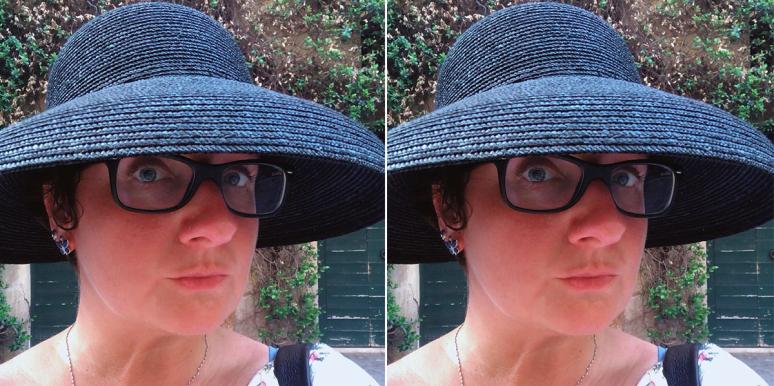When my first love and I broke up when I was 22, a mutual decision, I flippantly wished he’d be hit by bus, break a leg, or something else awful.
To quote Samantha Jones: “There’s always a contest with an ex, it’s called ‘who will die miserable,’” — and that wasn’t just my thinking then, but a thought process I’ve carried with me when it comes to men who have broken my heart.
While I didn’t continue to actively wish horrible things to happen to this first love, his life did end up being ‘miserable’ — to use Samantha’s word — in many ways. Because it’s his life and not my story to tell, the short version is that he ended up in jail for drugs and his fiancée died in her early 30s.
These two things happened within a year of each other and 12 years after we broke up. In the years in between, we became friendly again, as he worked at a bar around the corner from my apartment in the East Village in New York City and I no longer had ill will toward him. I wanted nothing but the best for him.
I was heartbroken when I heard the news from his sister and reached out to him in jail. We exchanged a few letters, writing about the past, the new albums we were listening to and I even told him I hoped he’d again pursue his art — he’s a phenomenally talented painter — when he was released.

Although I felt guilty in some ways for the wish I’d made over a decade ago, I rationalised it with why we broke up: He was heading in a direction that I wouldn’t follow in; I may love to drink, but drugs are a different story. So it wasn’t me who had done this to him — he had done it to himself.
The same day my first love was released from jail I married my French fiancé Olivier in Paris. As I’ve written before, it was not an ideal situation. We were not suited for each other for the long-term and our love, as cliché as it sounds, should have ended shortly after it began.
I ran into Olivier’s arms trying to outrun an unrequited love (we’ll get to him in a second) and I’d convinced myself that if I could love Olivier so much as to marry him, then it would be proof that I was capable of moving past S — that I had survived S and the evidence was in my new love and my new life with Olivier.
But my marriage to Olivier was short-lived. At the time, in my pain and humiliation, I was unable to see both sides of where things went wrong. While he was guilty of cheating and lying, I was guilty of not accepting him as he was and trying too hard to change a man who was never going to change.
When Olivier left me for a 21-year-old woman who — let’s not forget — sent me a poem about her love for Olivier, to which I responded in kind with a parcel full of horse sh*t (yes, really), I was experiencing a rage so blinding, so all-consuming, that I wished for his death every day.
Not a single day would go by without me begging the Universe to finish him off and put him in a casket where he belonged — and yes, these were my actual thoughts.
They weren’t flippant thoughts, as they had been with my first love; they were deliberate, obsessive, and became my morning mantra. I was so destroyed that I remember thinking how lucky he was that I was in New York and he was in Paris, because I would have killed him with my bare hands.
Then, just a couple of months after we made amends and reached civility, which meant me conceding I was equally to blame for the failure of our marriage, he died.
On July 7, 2017 I got the call from his oldest daughter.
Olivier was gone; heart failure.
We had just texted hours before his death about plans we had made to have lunch when I got to Paris the following week. We had scheduled for Thursday, not knowing that that would be the day he would be buried in a cemetery with a view of the only city he ever called home: Paris.
I struggled for months after his death.
I blamed myself. I blamed the altar I’d set up. In my most desperate and maddening moments, I convinced myself I had murdered him through sheer will. I may not be able to will myself a book deal or a date with Taika Waititi, but apparently I could will death upon my cheating husband.
Just as I was starting to recover from the loss of Olivier, S came back into my life.
I was 31 and S was 28 when we fell in love. He came into my life after my first love, but before Olivier, and our relationship lasted for around for four years — a very tumultuous four years. It’s hard to maintain a healthy friendship with someone when you’re in love with them and they’re not in love with you. I knew how he felt, but I willingly continued to break my heart over and over again with S.
So when it came to an explosive end, as that was the only way it could end, I grieved him in a way I have grieved no other. To this day, I’ve still yet to fully recover from that loss. In fact, S at 28 will forever be the love of my life.
But when he came back into my life, he was no longer the 28-year-old kid with whom I’d danced around the Lower East Side and Williamsburg, listening to Belle and Sebastian, without a care in the world.
He was now a man in his late 30s, a man who was so much the same, but also so different. A man I still loved and had never stopped loving, but time and life experience had changed my love for him. I finally loved him like I should have all along: like a friend or, more precisely, like family.
S was a unique case. I knew the parameters of our relationship and refused to stay within them. While I cursed him when it all came to an end and hoped he’d someday know the suffering I was experiencing, just as I had with my first love and would do with Olivier, I never truly believed that what I was putting out into the world was going to happen.
These are things you say and think because it makes you feel better in a sick sort of way. You never think, for even the briefest of moments, that somewhere down the line you’ll have to bear witness to any of it.
The ultimate torture came last year when S was having a hard time with his relationship. He usually plays things close to the chest — and prefaces things he says to me with, “you can’t write about this” — but he’d have these moments where he’d share the devastating loss he was experiencing.
The particulars — as I’ve promised him — are off-limits, but he was suffering. It was a loss I knew all too well because it was what I felt when I lost him.
It was excruciating to hear someone I loved so much and had loved for so long in so much pain.
I wanted to fix it for him, tie him to a chair and scoop out all the sadness he was feeling. I was heartbroken for him, I would have absorbed all of his despair and carried it around inside me instead. I could take it; I’d been there before and I would have done it all again for him.
I’d get off the phone and cry, convinced this was it, this was the punishment that I had forced upon myself for all the evil wishing I’d done in my life.
I had to witness it, I had to be privy to it, I had to have my heart break all over again for these three men if I was going to learn a lesson.
I’m not a religious person. I don’t believe in God; I don’t believe in Heaven or Hell or purgatory or any of the rest of it.
But I do believe in the Universe, the impressions we make while we’re here on Earth, and echoes that last long after we’re gone.
All of which make me wonder if I should be seeking redemption or promising myself, albeit selfishly, to never wish for what may come back to hurt me in the future.
As Anton Chekhov wrote: “It’s so clear, you see, that if we’re to begin living in the present, we must, first of all, redeem our past and then be done with it forever. And the only way we can redeem our past is by suffering.”
I have suffered at the expense of my own wishful thinking, so maybe that means the playing field is even for now.
I just need to learn that while vengeance makes for a great plot line in a book or movie, in real life it just causes more heartbreak.

